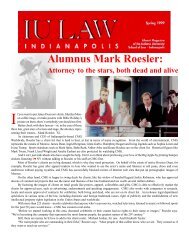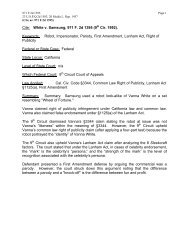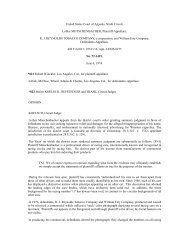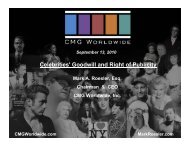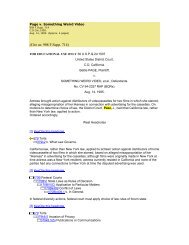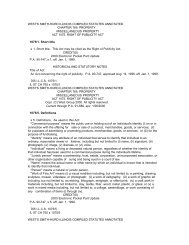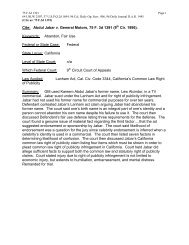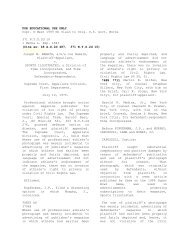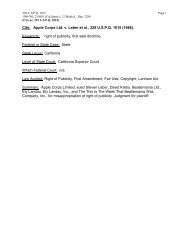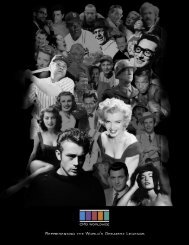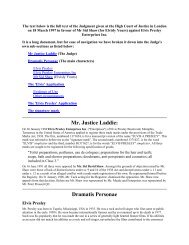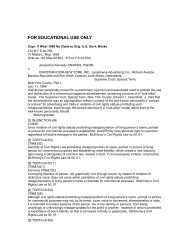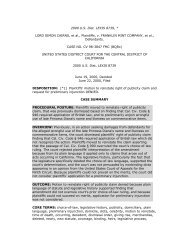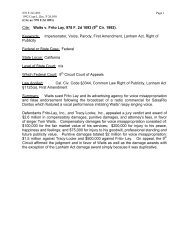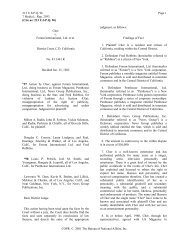Hustler v. Falwell.pdf - Mark Roesler
Hustler v. Falwell.pdf - Mark Roesler
Hustler v. Falwell.pdf - Mark Roesler
Create successful ePaper yourself
Turn your PDF publications into a flip-book with our unique Google optimized e-Paper software.
- - - - - - - - - - - - - - - - - -Footnotes- - - - - - - - - - - - - - - - - -<br />
n5 Valentino had a right of publicity in his name and likeness. In light of<br />
the disposition of this appeal, I need not decide whether any right of publicity<br />
would attach to Valentino's "personality." It is interesting to note, however,<br />
that appellant has not provided -- and I find it difficult to discern -- any<br />
easily applied definition for this amorphous term.<br />
- - - - - - - - - - - - - - - - -End Footnotes- - - - - - - - - - - - - - - - -<br />
It must therefore be determined whether respondents' conduct constituted an<br />
infringement of Valentino's right of publicity. In resolving that question, the<br />
context and nature of the use is of preeminent concern. Valentino's name and<br />
likeness were allegedly used in a work of fiction [*865] broadcast on<br />
television. Appellant characterized respondents' film as "a work of fiction<br />
about the life and loves of an Italian actor who became Hollywood's first<br />
romantic screen star and who died at the height of his fame." Valentino was<br />
identified as that character. n6<br />
- - - - - - - - - - - - - - - - - -Footnotes- - - - - - - - - - - - - - - - - -<br />
n6 Such statements establish that this is not a case in which the use is<br />
wholly unrelated to the individual. A different result may follow if, for<br />
example, respondents had published Rudolph Valentino's Cookbook and neither<br />
the<br />
recipes nor the menus described in the book were in any fashion related to<br />
Rudolph Valentino. (Cf. Grant v. Esquire (S.D.N.Y. 1973) 367 F.Supp. 876;<br />
Gill<br />
v. Hearst Publishing Co. (1953) 40 Cal.2d 224 [253 P.2d 441]; Leverton v.<br />
Curtis<br />
Pub. Co. (3d Cir. 1951) 192 F.2d 974.)<br />
While Valentino's name was allegedly used to advertise this particular film,<br />
this is not a case in which a celebrity's name is used to promote or endorse a<br />
collateral commercial product or is otherwise associated with a product or<br />
service in an advertisement. (See, e.g., Stilson v. Reader's Digest Assn.<br />
PAGE 45<br />
25 Cal. 3d 860, *865; 603 P.2d 454, **457;<br />
160 Cal. Rptr. 352, ***355; 5 Media L. Rep. 2208 FOCUS<br />
Inc. (1972) 28 Cal.App.3d 270 [104 Cal.Rptr. 581]; Motschenbacher v. R. J.<br />
Reynolds Tobacco Company (9th Cir. 1974) 498 F.2d 821; Lombardo v. Doyle,<br />
Dane &<br />
Bernbach, Inc. (1977) 58 App.Div.2d 620 [396 N.Y.S.2d 661].)<br />
- - - - - - - - - - - - - - - - -End Footnotes- - - - - - - - - - - - - - - - -<br />
Film is a "significant medium for the communication of ideas." (Joseph<br />
Burstyn, Inc. v. Wilson (1952) 343 U.S. 495, 501 [96 L.Ed. 1098, 1105, 72<br />
S.Ct.<br />
777].) Whether exhibited in theaters or on television, a film is a medium which<br />
is protected by the constitutional guarantees of free expression. (U.S. Const.,<br />
1st and 14th Amends.; Cal. Const., art. I, @ 2; Joseph Burstyn, Inc. v. Wilson,<br />
supra, 343 U.S. at pp. 501-502 [96 L.Ed. at pp. 1105-1106]; Red Lion<br />
Broadcasting Co. v. FCC (1969) 395 U.S. 367, 386-390 [23 L.Ed.2d 371,



